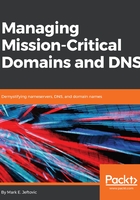
上QQ阅读APP看书,第一时间看更新
Uniform Rapid Suspension System (URSS)
The Uniform Rapid Suspension System (URSS) is a newer policy designed to make a faster and more affordable dispute resolution mechanism available to rights holders. A URS action can only be initiated against domains under the new TLDs. (A UDRP may also be filed against a domain under a new TLD, but not the inverse.)
The URS contains similar elements to the UDRP:
- The Complainant files their complaint via a sanctioned URS provider
- The Complainant must pay fees within 24 hours of filing or it is summarily denied
- The Complainant must provide details of the complaint as outlined in the URS procedure
As with the UDRP, three key elements must be asserted and all must be present:
- The domain is identical or confusingly similar to an existing mark
- The Registrant has no legitimate interest in or use for the name
- The name was registered in Bad Faith
There are two big differences in a URS decision, which are different from an UDRP:
- If it is in favor of the Complainant, the domain is not transferred to them, but rather put on hold and into an unusable state. The complainant does have an option to extend the registration period of the frozen domain at market rates.
- There is an appeal process. The UDRP doesn't have one.
What is "Bad Faith" ?
Other than a decent name for a rock band, "bad faith" is a required element of any successful UDRP or URS proceeding. The URS cites a non-exclusive set of "bad faith" conditions, including these:
Illegitimate gain
This means the Registrant has obtained the domain primarily for the purpose of profiting from the domain (via sale, rent, or otherwise transferring it) to the Complainant or to a competitor of the Complainant. This is important. Offering a domain name for sale does not in itself amount to bad faith. There has to be a specific impetus to somehow gain from the Complainant’s own marks. Offering a domain for sale that happens to coincide with a Complainant’s mark, but either predates it (was registered before the trademark) or also has other legitimate uses or connotations is not bad faith.
Blocking/Denial of Service
The registration of a domain to specifically deny a rights holder from obtaining it. Grabbing "google.somenewtld" would qualify here, especially if it were done by say, Bing. But, that said, if somebody registered macdonalds.blargh and their name, or the business really was MacDonalds, then it would not.
Other than a decent name for a rock band, "bad faith" is a required element of any successful UDRP or URS proceeding. The URS cites a non-exclusive set of "bad faith" conditions, including these:
Illegitimate gain
This means the Registrant has obtained the domain primarily for the purpose of profiting from the domain (via sale, rent, or otherwise transferring it) to the Complainant or to a competitor of the Complainant. This is important. Offering a domain name for sale does not in itself amount to bad faith. There has to be a specific impetus to somehow gain from the Complainant’s own marks. Offering a domain for sale that happens to coincide with a Complainant’s mark, but either predates it (was registered before the trademark) or also has other legitimate uses or connotations is not bad faith.
Blocking/Denial of Service
The registration of a domain to specifically deny a rights holder from obtaining it. Grabbing "google.somenewtld" would qualify here, especially if it were done by say, Bing. But, that said, if somebody registered macdonalds.blargh and their name, or the business really was MacDonalds, then it would not.